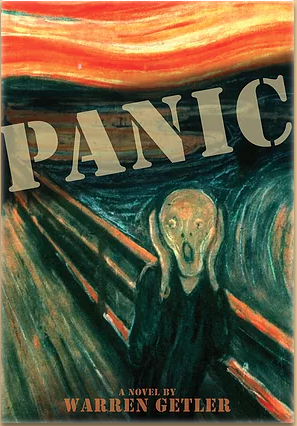Anxiety
New Book on Panic Attacks Offers Hope and Inspiration
A must-read for parents and teens who seek to understand panic disorders.
Posted November 10, 2019 Reviewed by Ekua Hagan

When I polled the members of my weekly teen therapy groups, over half reported experiencing panic attacks in the last year. This is why I am recommending a new book by Warren Getler entitled PANIC, a must-read for parents and teens who seek to understand the causes and conditions that promote panic disorders.
PANIC is the uplifting tale of a young man navigating the emotional peaks and valleys of panic disorder.
Warren Getler, a former journalist with The Wall Street Journal, Bloomberg News, and Discovery Channel, describes PANIC as a modern-day Wizard of Oz-like journey of self-discovery and personal triumph.
I sat down with Mr. Getler to discuss this timely and essential book. Here’s what he had to say:
Why do you refer to our era as the "Great Anxiety?"
It's kind of a wordplay on the phrase "Great Depression" in the sense that society as a whole is struggling with this huge anxiety phenomenon... students, parents, indeed tons of average, everyday people and, to be sure, a slew of celebrities in sports, TV, Hollywood who have spoken publicly about their challenges. So many of these folks from all walks of life are trying to figure out how best to cope with anxiety or panic disorder at a time of socio-economic uncertainty.
The American Psychological Association noted earlier this year: “Mental Health Issues Increased Significantly in Young Adults Over Last Decade.” It reported a sharp increase in young adults experiencing severe psychological stress in the previous 30 days from 2008 to 2017 (a jump from 7.7 percent to 13.1 percent in a nationally representative survey of almost 400,000 adults age 18 and over. The APA pointed to “cultural trends in the last 10 years,” including the increased use of digital media, as potentially having had a substantial effect on mood disorders.
The protagonist in PANIC lives a privileged life. Why does he suffer from panic attacks?
The point I'm making with the novel's principal character, the simpatico John D. Saster, is that his overbearing parents — well-to-do NYC-based Harvard grads who've been pushing their son into following their academic footsteps since the time he could walk — are creating a trainwreck right before their eyes, turning their boy into Johnny Disaster on so many emotional and psychological levels: interfering with his true self, his youthful self, and own voice.
The book begins with Johnny having a meltdown while taking the SAT and abruptly darting out into the street where an oncoming BMW strikes him. The journey into the terrifying world of panic disorder, and his muscular recovery, begins from there.
What's the Age of Anxiety campus tour?
I'm hoping to launch an "Age of Anxiety" college campus tour across the country, visiting some of the leading colleges and universities. These on-stage engagements, if things come together, would include a brief talk about the book, joined by remarks from a leading youth-focused therapist, and finally, a few fantastic songs performed by the band, Social Void, whose music is embedded in the pages of PANIC.
Chip Cooley, the Charleston-based band's leader, and a good friend had panic disorder — to the point he could not leave his home for over a year. All 12 tracks from the band's first album, reflecting the themes and melancholic tone of Chip's struggle, are embedded in the eBook PANIC.
Any responses from teenagers or college students who've read PANIC?
So far, the response has been very positive. People like a good story of a young kid's showing the world what he's made of... and there's a long Wizard-of-Oz dream sequence that will inspire readers. I'm holding out some glimmer of hope that PANIC can be turned into a movie... a senior Hollywood producer just optioned the novel. We'll see... fingers crossed!


